- Home
- Jay Bonansinga
The Sleep Police Page 12
The Sleep Police Read online
Page 12
Maybe it was the sleeplessness working on him now, the latter stages of his insomnia where the world mutates into one giant hallucination.
Frank had experienced every conceivable phase of sleep deprivation, from the irritability and trancelike staring jags of the early stages, to the raw nerves, slurred speech and hallucinations of the later phase. The longest he had ever gone without sleep was four days, and that was back when he had tried to wean himself off the Halcion tablets he was taking. He remembered the fourth day, walking around like a zombie, no appetite, incapable of focusing on the simplest task, his nervous system so jacked up his own footsteps were capable of making him jump. But that was right before he had passed out in the employee lounge at the Twenty-fourth.
Tonight was different. Tonight he was closing in on four days of sleeplessness, and he was still buzzing with nervous tension, still hyperalert. Was it the shock? Things seemed unreal, but it was a different kind of unreality than he remembered from his last binge of insomnia. Tonight the world around him seemed so clearly focused, so crisp, it almost looked artificial. The harsh, greenish quality of the fluorescent light glaring off Pope’s face. The sound of the marshal’s thick, mucousy breathing across the room. The dead flies behind the barred window panes. The sound of rain on the rooftops. Something was happening to Frank.
“I think I’d rather stay awake, Doc,” Frank said at last.
“You’re sure?” Pope asked.
“Definitely.”
There was an awkward pause.
“Okay, Frank.” Pope rose on his creaking knees. “In a few minutes, the marshals will be back in to get you ready. I’ll hang around and ride over there with you. Okay?”
Frank nodded. “That sounds fine.” Then he put his hand out. “I really appreciate all you’ve done for me, Doc.”
The two men shook hands.
Then Pope turned and walked out.
CHAPTER NINETEEN
They dressed Frank in hospital whites. They let him keep his leather shoes on. But they took everything else. His personal effects, his denim shirt and Ralph Lauren corduroys, his shield, his belt, everything. They sealed his things in a paper box—like a gift box—and filed it away for safekeeping.
They replaced his original shackles with new ones made of some shiny alloy. The wrist cuffs were connected to a leather belt around his waist, and the ankle cuffs were connected by a short chain. The shackles forced Frank to take awkward baby steps when he walked, and the chain made delicate jangling noises.
It was nearly midnight when they took him out the rear and into the night.
The cool mist felt good on Frank’s face as they lead him across the loading dock. There were four escorts. The two marshals, walking on either side of Frank, and Dr. Pope, shuffling along behind him, holding an umbrella over Frank like he was some kind of ragtag dignitary, and a beefy black orderly named Goodwell bringing up the rear. The air smelled of earthworms and car exhaust. The rain had settled into a steady, billowing curtain, the dirty water sluicing down the gutters along Ogden Avenue to the west.
The parking lot was nearly empty now, the intermittent lightning flashing like a photo-strobe, illuminating graffiti-stained ramparts and lonely streets. There were two uniformed cops waiting at the edge of the dock near an idling transport van, their faces shrouded by the hoods of their rain slickers and the bills of their hats. A beat car was parked nearby, its headlights cutting twin swaths through the rain, its engine idling above the noise of the rushing water.
“We’re gonna pause here for a second, Detective,” said the older marshal, a ruddy-complected man named Curless, gently taking Frank’s elbow and stopping him near the ramp that connected up to the back of the van. The splash of rain was moistening the bottoms of Frank’s togs, and Pope adjusted the umbrella over Frank as the younger marshal, a skinny man named Briggs, checked the ramp and unlocked the back of the van.
There was a strange sort of respect and courtesy being paid to Frank by the other officers. Mostly because of Frank’s reputation for being a good cop, a standup guy. Murder or no murder.
“Just one more second,” Curless said.
“How you doing, Frank?” Henry Pope asked.
Frank told the doctor he was doing fine, and thanks very much for asking.
Fifteen feet away, on the edge of the ramp, Briggs was opening the back of the transport van and revealing the interior in a sudden flicker of lighting: Filthy, corrugated iron floor, metal benches on either side, a waffled metal screen separating the front cab. Something troubling sparking in the back of Frank’s mind: (—they’ll put us away for a long, long time, and that’s probably the best thing—)
“You okay, Frank?”
Pope’s voice next to him. Steadying him. Giving him courage.
Frank sniffed the air as though it were smelling salts. “Yeah, Doc, I’m fine.”
The younger marshal came up the ramp and nodded at his partner. Curless took Frank’s arm. “Here we go, Detective,” he said, and started Frank down the ramp, then into the transport vehicle.
The inside of the van smelled like fear. The sharp, garlicky aromas of body odor and greasy hair and nerves. Frank could smell the emotions clinging to the rusty metal walls. He sat down on one side, the bench hard and cool beneath his ass. His heart felt like a stone. There was an Ithaca clamped to the wall across from him. The shotgun gleamed in the rays of streetlight slanting through the back.
“Mr. Curless and Mr. Goodwell are both going to ride back here with us, Frank,” Dr. Pope said.
Frank said that was fine.
The orderly took a seat opposite Frank.
“I’m gonna have to secure your shackle to the floor,” the older marshal told Frank.
Frank said that was no problem.
Curless knelt down near Frank’s feet and fiddled with a set of keys, while Briggs stood outside the rear doors watching.
“Closing the doors now,” the younger marshal said, and Frank glanced over his shoulder at the rear of the van. The dim illumination from sodium-vapor lights faded away as Briggs swung the doors shut.
The doors clanged with a strange finality.
(—put us away for a long, long time—)
Frank closed his eyes.
“Frank?”
“I’m okay,” Frank said, looking over at Pope, who was sitting on the bench next to him.
The older marshal pulled the shotgun off its clamps, then took his place near the rear doors, squatting, checking the Ithaca’s breech. In front, the cab door slammed, the engine revved, and the van surged away from the dock.
“I got something for you,” Pope was saying over the whoosh of the tires on wet pavement.
Frank looked at the psychiatrist. “I’m sorry—what?”
“I got something for you,” Pope said again, fishing around in his jacket pocket.
The van was swaying gently, pulling out onto Ogden Avenue and heading west toward Roosevelt Road, the wiper blades slapping in rhythm with the bumps. Through the waffled grating in front, Frank could just barely make out the red-blue flash of the escort car’s lights reflecting off the van’s windshield. He turned to the psychiatrist.
Pope was digging in his breast pocket. “It’s here somewhere,” he was saying. “Ah! Here it is.”
Pope pulled something shiny from his coat. He dangled it across Frank’s shackled hands.
Frank looked down and saw a gold chain with something attached at the end. He took a closer look. It was a gold crucifix about two inches long. Frank looked up at the psychiatrist. “I don’t understand.”
“The psychiatric community gets a bum rap sometimes for being antispiritual,” Pope said.
Frank was confused.
Passing headlights were slithering across the inside walls of the van, momentarily illuminating the doctor’s weathered face. “It was my mother’s,” he said, a sad glint in his eyes. “Remarkable Scots-Irish woman. Married for sixty-five years to the same man—a cop. Had seven kids. The da
y I got out of the academy, she went to mass and made a deal with God. Said she’d give the force one of her seven kids, but she wanted the rest to be civilians.”
The van hit a bump, and Frank looked back down at the crucifix. It was old, the gold dull, the chain slightly oxidized. The center of the cross was a bulbous sacred heart, big enough to contain a photo. “I still don’t—”
“I just thought it might give you a little comfort,” Pope said.
Frank was vexed. He was an agnostic. He had prayed maybe twice in his whole life. He looked up at Pope. “I appreciate the gesture, Henry.”
The psychiatrist shrugged. “I just thought, all that stuff about doing God’s work, you know.”
Frank stared at him. “Pardon me?”
“The tape. On the tape. Your alter said he was doing God’s work.”
An icy finger brushed the back of Frank’s neck. “Excuse me?”
“The tape, the videotape, the first one.” A slice of a passing headlight slid across the doctor’s face. “The other personality had said he was doing God’s work. Right? And I thought you might find comfort in prayer.”
Frank froze.
The passage of time itself suddenly seemed to seize up inside the dark, swaying van.
Frank tried to speak, tried to act as though nothing had happened—as though they had just exchanged some meaningless bit of encouragement—but it was difficult, it was difficult hiding his shock.
“What is it, Frank? What’s wrong?”
The other men were looking at Frank now—Goodwell, the orderly, his chiseled black face almost blue in the darkness, and Curless in back, the old veteran, clutching his shotgun. Something was wrong.
“Frank—?”
All at once the realization struck Frank hard, a tidal wave of emotion crashing down on him.
It couldn’t be. It was impossible. Impossible. But there was no other explanation. No other explanation. All at once, the night had turned to day, and good had turned to evil, and Frank’s world had turned inside out, the sheer abruptness of the revelation choking the breath out of him—pure, white-hot rage slamming into sudden relief, mixing with paralyzing fear and utter disbelief.
He was innocent.
The van took a tight turn, the g-forces pressing Frank against the wall. Frank tensed.
Pope stood up, and Goodwell sprang to his feet. “Looks like he’s having a seizure,” the orderly said.
“I’m—I’m—”
An idea flickered suddenly in Frank’s mind, and he acted on it almost immediately.
“Frank, what’s wrong?” Pope said urgently, reaching down for Frank, but it was too late.
Frank had suddenly acted out the very condition he had been suffering for most of his adult life, and he did an extremely convincing job of it, his movements perfectly capturing the telltale symptoms—his body slumping, his head lolling backward and his eyes rolling back into their sockets.
And he slid sideways until his shoulder landed hard on the bench and his shackles went taught.
And he pretended to pass out.
CHAPTER TWENTY
He felt Pope’s palsied, sandpaper fingertips on his neck, searching for a pulse, and suddenly the old man’s touch was no longer benign, no longer softly paternal. It was scaly and gritty now, like the back of a snake. Frank could hear the others gathering over him, and he heard Curless saying something into his radio, probably signaling the escort car.
“Two-twenty, stand by,” the older marshal was saying. “Got a possible ten-thirty-three with the prisoner. Stay on course. Will advise.”
“Pulse is elevated,” Pope was saying, his hands pressing down on Frank’s forehead. “Feels like he’s running a temperature.”
“What’s going on?” The sound of Briggs’ voice from the front.
“Keep following the squad!” Curless yelled.
Eyes closed, heart thumping, mind swimming with panic, Frank tried to think. The drugs had mostly worn off, but Frank was still pretty woozy, pretty dazed. This phony blackout would only buy him a few minutes of time, but it would be time well spent. He would only have one chance.
One chance.
“What’s the matter with him?” Curless demanded.
“I think he’s having another syncopal attack,” Pope replied.
“A what?”
“A fainting spell,” Goodwell informed him.
Frank continued feigning unconsciousness, letting his body go limp against the bonds while the others hovered over him. The shackles were digging into his ankles. He could taste blood in his mouth. He tried to visualize his next move, like an athlete visualizing a big play, relying on one specific piece of good luck.
A long shot.
If Frank let enough drool bubble out of his mouth, and he twitched a little bit, then maybe...just maybe...
“Take the shackles off, Curless, quickly!” Pope ordered all of a sudden.
“We’re not supposed to—”
“I think he’s preconvulsive! Please! Do it now!”
Eyes locked shut, Frank was shivering and twitching. He could feel Curless fumbling at the ankle locks. Within seconds he was completely free of all the cuffs, and he could feel Pope and Goodwell lifting him up into a supine position on the bench, steadying him gently. Frank allowed one eyelid to crack open just enough to see his target: Curless’s Ithaca, tucked under the marshal’s arm, gleaming in the dim light. Frank’s heart was racing.
Pope reached down, and pushed open Frank’s eyelid. “That’s strange,” the doctor said.
All at once Frank sprang from the bench—
—and chaos erupted.
It all happened in the space of an instant, but to Frank, as he lurched toward Curless, it seemed as though time was mired in slow motion, like a nightmare.
The marshal was caught off-guard—as was Goodwell, as was Pope—and Frank slammed into Curless with everything he had, like a linebacker putting a solid hit on an unsuspecting tight end. Pain shrieked across Frank’s collarbone, stars bursting in his line of vision as Curless tumbled backward.
Both men careened to the floor, and Frank put every last ounce of energy into grabbing the shotgun before Curless could figure out what was happening. Frank got one hand on the butt, then clutched at the stock with the other, and by the time Curless had managed to grab at the weapon, Frank had already yanked it free.
“EVERYBODY BACK!” Frank screamed at the top of his lungs, falling back against the rear doors.
Pope and the others froze.
“NOW!” Frank said, struggling to his feet. He pumped the slide for emphasis, the Ithaca feeling as natural as a girlfriend’s hand in Frank’s grasp, the product of endless hours on the shooting range, obsessively practicing, exorcising all his neurotic fears.
The Ithaca clanged.
The others stiffened at the sound. Curless glanced toward the cab.
“Keep driving, Briggs!” Frank hollered at the younger marshal.
In front, behind the waffled steel, Briggs was nodding, keeping his hands on the wheel. The tension in the van was like a pressure cooker about to burst, the rain lashing the metal roof, the occasional slash of a streetlights slicing across the dark walls.
Frank jabbed the shotgun at Curless. “Hands where I can see them, guys! Now! Please! Up against the wall! Do it now before somebody gets hurt!”
Curless and Goodwell raised their hands, then slowly backed against the wall opposite Pope. But the psychiatrist wasn’t moving. He wasn’t budging an inch. He was still kneeling next to the bench where Frank had first pretended to collapse.
“You too, Doc,” Frank said. “Over against the wall.”
Pope was giving him a sidelong glance. “Aren’t you going to introduce yourself?”
“What?” Frank was momentarily baffled.
“I haven’t had the pleasure,” the psychiatrist said in a steady, measured tone.
“What are you talking about?”
“You’re the Sleep Police, I presume.�
��
There was a tense pause as the van splashed through a series of potholes.
All at once it hit Frank just exactly what was going on. “It’s not what you think, Doc,” Frank said, his eyes welling with emotion, the adrenaline making him tremble furiously, making him sick to his stomach. A flash of tungsten light slid across the dark walls.
“Do you have a name?” the psychiatrist said.
“It’s still me, Doc.”
“Who’s that?”
“It’s Frank, it’s still Frank, and I am asking you to please go over and stand against that wall.”
The psychiatrist licked his lips thoughtfully, rising to his feet, putting his hands in the air. A band of light was angled across his withered face. “Okay, no problem, but I don’t believe Frank Janus would ever do anything like this. Do you?”
“Doc, please—”
“I’m just saying, Frank Janus is one of the most decent people I’ve ever met. Gentle even. I don’t think he would ever dream of—”
“MOVE OVER AGAINST THE WALL!!” Frank stabbed the Ithaca at Pope’s face, hollering at the top of his lungs. “NOW! MOVE! OVER AGAINST THE WALL!”
“Can I speak to Frank—?”
“I SWEAR I WILL PULL THE TRIGGER IF YOU DON’T DO WHAT I SAY RIGHT NOW!!”
There was a tense beat of noisy silence, the van rumbling around another curve, splashing through potholes. A carousel of vapor light moved across the walls. Where were they heading now? Panic spurted through Frank’s veins. Was Briggs talking them back to Area Six headquarters?
The psychiatrist was reluctantly backing against the wall, facing Frank, hands in the air. “May I ask you a question?” Pope said finally.
“Sorry, Doc, no,” Frank said, glancing out the narrow meshed window at the passing nightscape. They were heading down South Michigan Avenue, past the brooding spires of St. Michaels Cathedral, the gray, gothic towers engulfed in the rain.
“I was just wondering—” the doctor began.

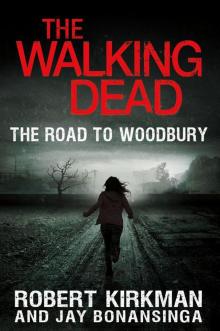 The Walking Dead: The Road to Woodbury
The Walking Dead: The Road to Woodbury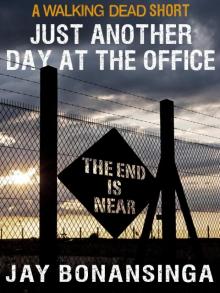 Just Another Day at the Office
Just Another Day at the Office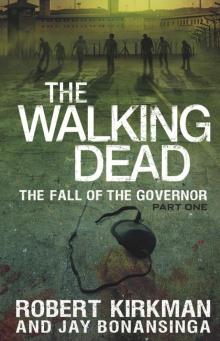 The Fall of the Governor: Part One
The Fall of the Governor: Part One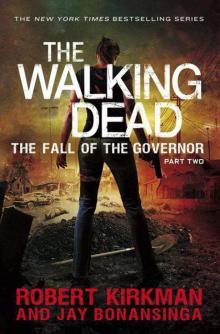 The Walking Dead: The Fall of the Governor: Part Two
The Walking Dead: The Fall of the Governor: Part Two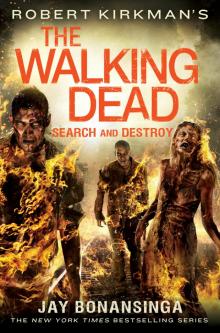 Search and Destroy
Search and Destroy Invasion
Invasion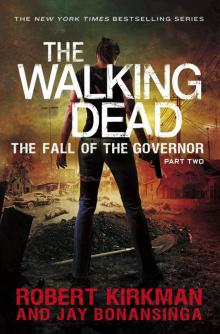 The Fall of the Governor: Part Two
The Fall of the Governor: Part Two The Walking Dead Collection
The Walking Dead Collection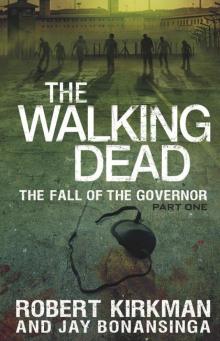 The Walking Dead
The Walking Dead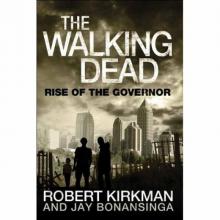 Descent
Descent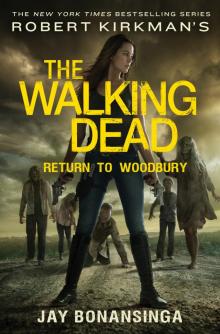 The Walking Dead: Return to Woodbury
The Walking Dead: Return to Woodbury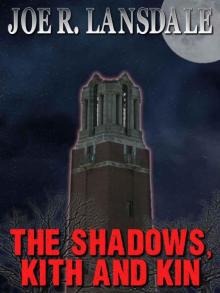 The Killer's Game
The Killer's Game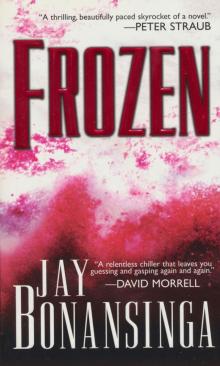 Frozen
Frozen Shattered
Shattered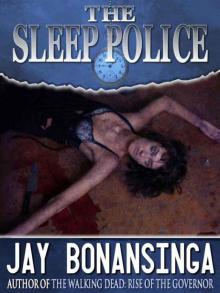 The Sleep Police
The Sleep Police Perfect Victim
Perfect Victim